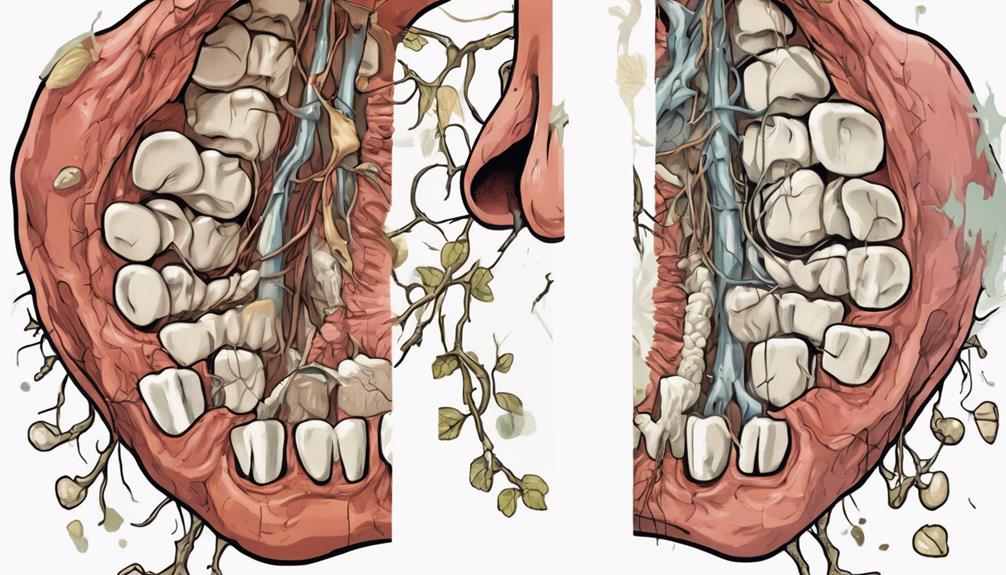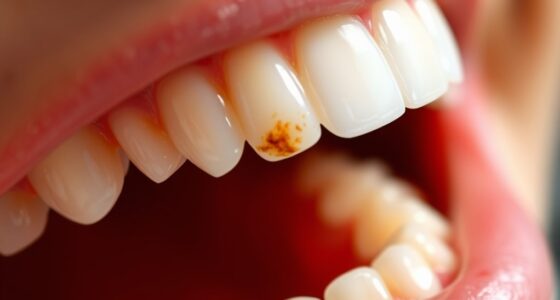Yes, kidney issues can cause bad teeth. When you have kidney disease, your immune response weakens, making you more susceptible to oral infections. This can lead to gum disease and tooth decay. Studies show that a 10% increase in gum infection correlates with a 3% decline in kidney function. Also, conditions like dry mouth from kidney problems increase the risk of cavities. Maintaining good oral hygiene and regular dental visits are essential in managing these issues. If you're curious about how to better protect your teeth while managing kidney health, there's more to explore on this topic. In addition to the increased risk of oral infections, kidney issues can also impact the development of teeth. Research has shown that kidney disease can affect the baby teeth eruption sequence, leading to potential dental issues in childhood. It’s important to work closely with both your dental and medical care providers to address any oral health concerns related to kidney disease. By staying informed and proactive, you can better protect your teeth while managing your overall kidney health.
Key Takeaways
- Kidney disease weakens the immune system, increasing vulnerability to oral infections and poor dental health.
- Chronic kidney disease (CKD) often leads to dry mouth, raising the risk of cavities and gum disease.
- Gum disease can exacerbate kidney issues, creating a harmful cycle that affects both oral and kidney health.
- Medications for kidney problems may impair healing, worsening dental conditions and complicating oral health.
Impact of Kidney Problems on Oral Health
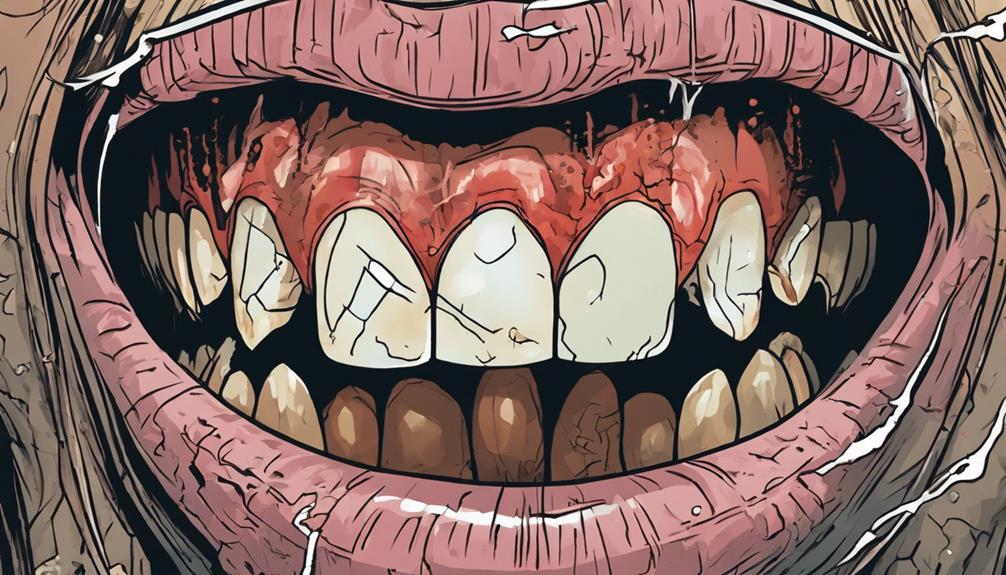
Kidney problems often lead to significant oral health issues, including bad breath and painful mouth ulcers. When you're dealing with kidney disease, your body's ability to fight off infections weakens, putting you at a higher risk for various oral health problems.
The compromised immune system can allow harmful bacteria to thrive in your mouth, leading to infections that may require dental extractions. Moreover, conditions like renal osteodystrophy can cause the demineralization of the oral cavity, threatening the bones that support your teeth. This deterioration not only affects your dental care but also leads to discomfort and complications during routine activities like eating and speaking.
Medications prescribed for kidney issues can further complicate matters, as they may hinder your body's healing processes. This means that even minor oral health problems could escalate into more severe issues, impacting your overall well-being.
It's essential to stay vigilant about your oral health if you have kidney disease, as maintaining proper dental care can help mitigate these risks and improve your quality of life. Regular visits to your dentist can make a significant difference in managing these challenges.
Link Between Chronic Kidney Disease and Teeth
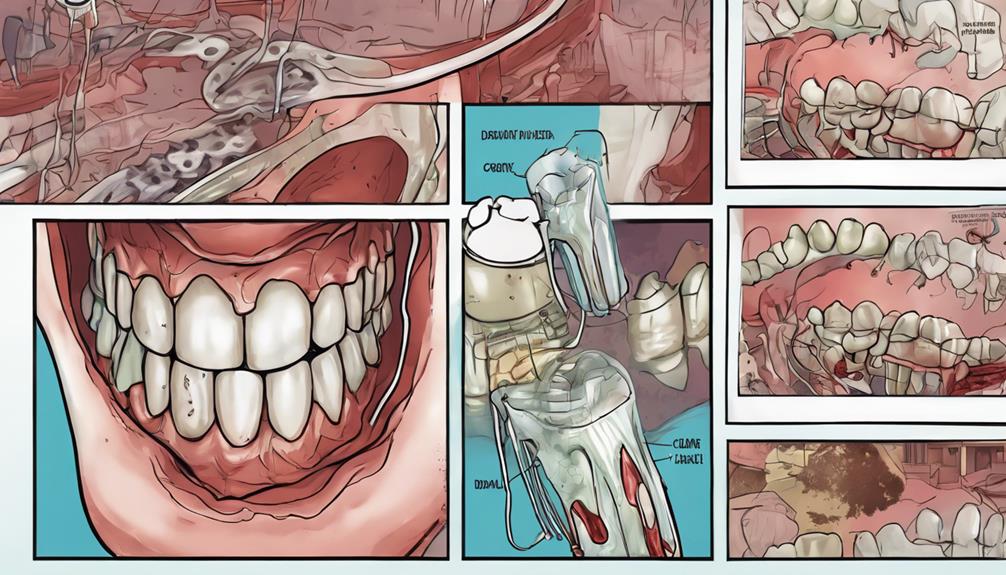
When you think about chronic kidney disease, it's essential to take into account how it affects your oral health.
Oral infections can worsen kidney function, while gum disease can create a vicious cycle that accelerates both conditions.
Understanding this link can help you take better care of your teeth and overall health.
Oral Infections and Kidney Function
Oral infections can greatly impact kidney function, making it vital for those with chronic kidney disease (CKD) to prioritize their dental health. When you have CKD, your immune system may be weakened, increasing the likelihood of oral health issues like gum disease and tooth decay.
Studies show that a mere 10% increase in gum infection correlates with a 3% decline in kidney function, highlighting the direct link between your oral health and kidney health. Infections in your mouth can allow harmful bacteria to enter your bloodstream, potentially exacerbating existing kidney problems.
Additionally, many CKD patients experience dry mouth, which raises the risk of cavities and gum disease, ultimately compromising your overall dental health. To mitigate these risks, regular dental check-ups and maintaining proper oral hygiene are essential.
Brushing and flossing daily, along with staying hydrated, can help prevent infections that could further impair your kidney function. By taking care of your mouth, you're not just protecting your teeth but also supporting your kidney health.
Prioritize your dental care to keep both your smile and kidneys healthy.
Impact of Gum Disease
Gum disease greatly impacts your overall health, especially if you're dealing with chronic kidney disease. The relationship between gum disease and kidney function is essential, with studies showing that a 10% increase in gum infection correlates with a 3% decline in kidney function. This means maintaining good oral hygiene is crucial for protecting your kidneys.
| Gum Disease Impact | Kidney Function | Oral Hygiene Importance |
|---|---|---|
| Increases systemic inflammation | Can worsen kidney conditions | Prevents periodontal disease |
| Bacteria can enter bloodstream | May lead to complications | Regular dental check-ups |
| Weakened immunity in CKD patients | Accelerates kidney dysfunction | Daily brushing and flossing |
Oral Health's Effect on Kidney Function
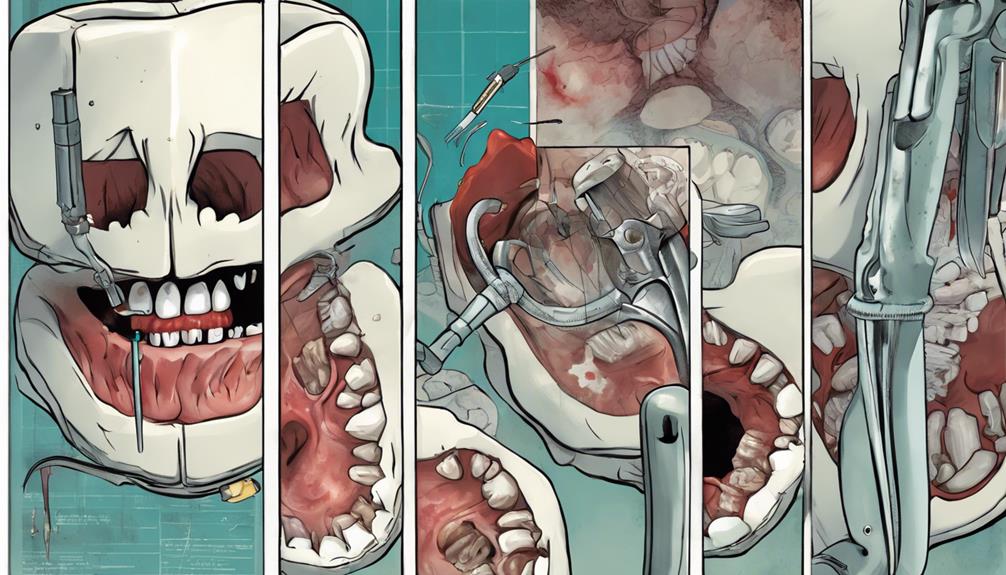
Your oral health plays an essential role in kidney function, and neglecting it can lead to serious complications.
Inflammation from gum disease not only harms your mouth but can also strain your kidneys.
Oral Inflammation and Kidneys
Neglecting dental health can lead to systemic inflammation that worsens kidney function and accelerates disease progression. When you ignore oral hygiene, the risk of gum disease increases, and chronic infections can develop.
These infections not only affect your mouth but can also enter your bloodstream, creating complications for your kidneys. Research shows that a 10% increase in gum infection correlates with a 3% decline in kidney function. This highlights a direct link between your oral health and kidney performance.
If you have existing kidney disease, you're already at a higher risk for oral health issues, including periodontal disease, which can further deteriorate your overall health. Infections from your gums can exacerbate kidney disease, leading to a vicious cycle that's hard to break.
Periodontal Disease Impact
Periodontal disease greatly impacts kidney function, creating a harmful cycle of inflammation and health deterioration. When you experience gum infections, harmful bacteria can enter your bloodstream, potentially affecting your kidneys. Research shows that a 10% increase in gum infections correlates with a 3% decline in kidney function. This connection highlights how poor oral health can contribute to kidney disease.
Moreover, there's a bidirectional relationship between these two health issues. A study indicates that a 10% reduction in kidney function is linked to a 25% increase in periodontal inflammation. This means that if you have kidney disease, you're likely to experience more severe periodontal disease, which can complicate your overall health management.
Chronic inflammation from periodontal disease can exacerbate kidney conditions, making it essential to prioritize your oral health. Maintaining good oral hygiene and seeking regular dental care can greatly mitigate the risks associated with periodontal disease and protect your kidney function. By taking these steps, you're not just caring for your teeth; you're also supporting your kidneys and overall health.
Dental Care for Kidney Disease Patients
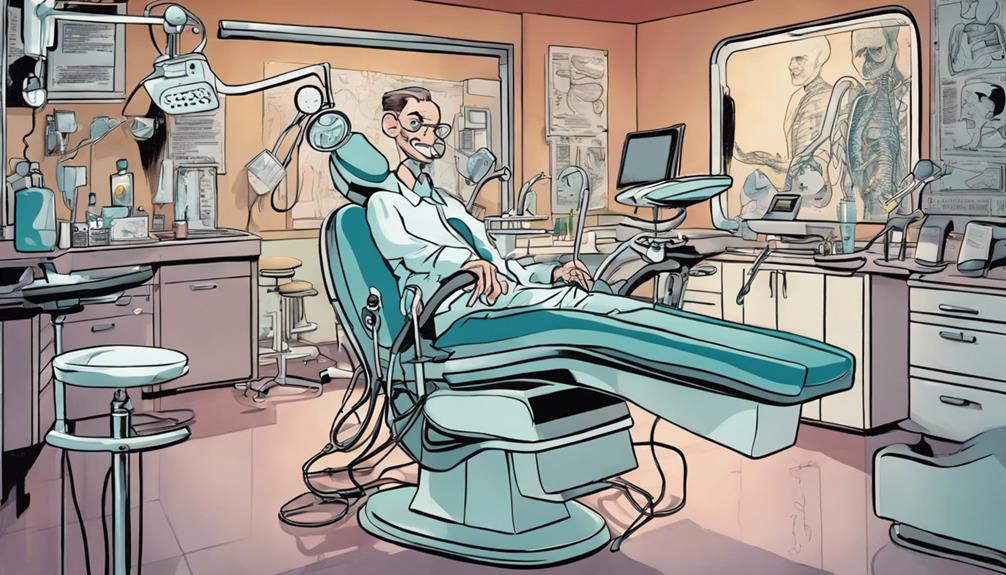
Dental care plays an essential role in managing overall health for patients with kidney disease, as it helps prevent complications that can arise from oral infections.
Since individuals with kidney disease are more vulnerable to issues like gum disease and tooth decay, maintaining good oral hygiene is imperative.
Here are some key practices to follow:
- Schedule regular dental check-ups: Don't skip your appointments; they're essential for catching minor issues before they become major problems.
- Communicate your health status: Always inform your dentist about your kidney disease. This allows them to tailor your treatment plan and dental procedures accordingly.
- Practice excellent oral hygiene: Brush and floss daily to reduce the risk of infections that can worsen kidney function.
- Plan dental procedures wisely: Opt for treatments on non-dialysis days to minimize complications and promote better healing.
Special Considerations for Dialysis Patients
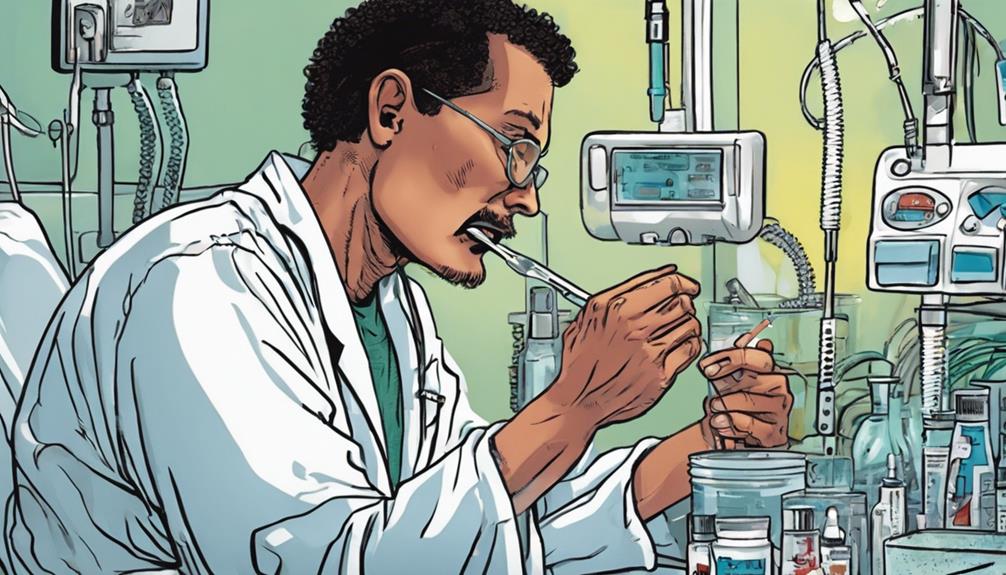
For dialysis patients, managing oral health requires special attention due to unique challenges like dry mouth and the effects of blood thinners.
Dry mouth can lead to reduced saliva production, increasing your risk of tooth decay and gum disease. Since saliva plays a significant role in neutralizing acids and washing away food particles, its absence can create an environment where dental issues thrive.
Additionally, if you're taking blood thinners, be aware that these medications may heighten your risk of bleeding during dental procedures. It's important to communicate your medication regimen to your dentist, ensuring they take necessary precautions during treatment. Ideally, schedule dental appointments on non-dialysis days to minimize complications and maximize your comfort.
Maintaining healthy teeth is essential for you, especially since your diet may require high-quality protein foods. If your oral health suffers, it can hinder your ability to consume these important nutrients.
Regular dental check-ups are significant to prevent serious infections that could further complicate your overall health. By prioritizing your oral health, you can better manage the challenges that come with dialysis.
Importance of Dental Check-ups Pre-Transplant
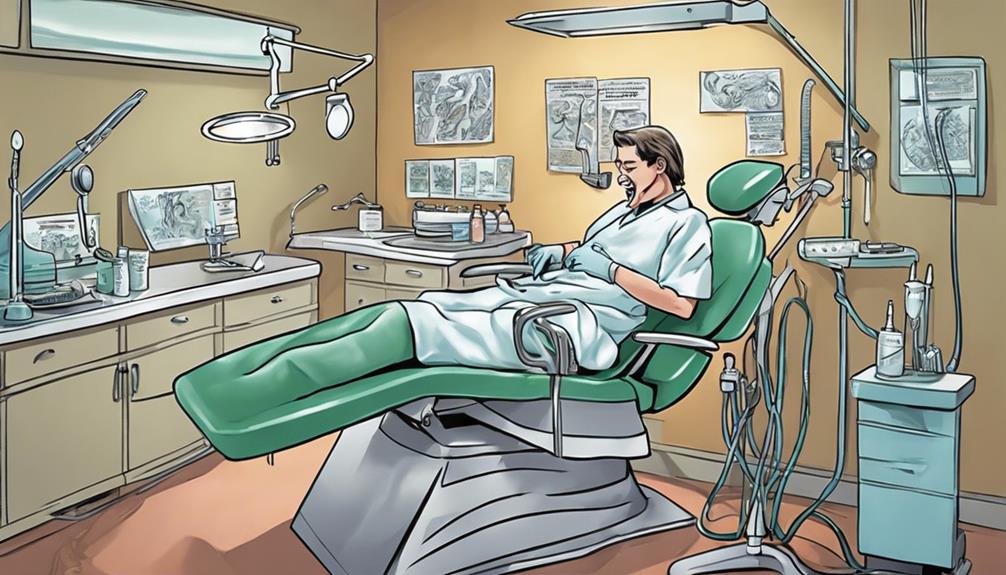
Regular check-ups are essential before your kidney transplant to catch any dental issues that could lead to complications during and after the procedure. Addressing these health concerns can greatly improve your chances of a successful surgery and recovery.
Here are four important reasons to prioritize your dental health before your transplant:
- Identify Infections: Thorough dental examinations can help detect infections like gum disease or tooth decay that may complicate your surgery.
- Prevent Delays: Serious dental issues can delay kidney transplant evaluations and approvals. It's vital to resolve these before moving forward.
- Medicare Coverage: Medicare often covers dental clearance exams for transplant candidates, ensuring your oral health is in good shape before surgery.
- Post-Transplant Care: After your transplant, your immune system will be compromised, making good dental hygiene even more important. Increased check-ups may be necessary to monitor your dental health.
Oral Hygiene Best Practices
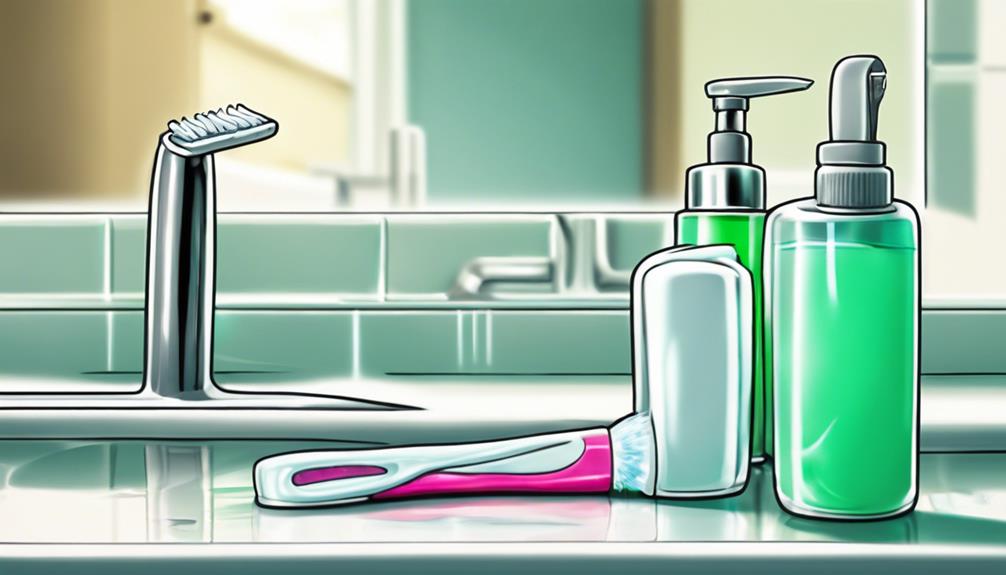
Maintaining good oral hygiene is essential, especially for those with kidney issues, as it can greatly reduce the risk of complications and improve overall health.
Start by brushing your teeth twice daily with a soft bristle brush and fluoride toothpaste. This helps remove plaque and prevents cavities, which is vital since individuals with kidney problems may be more prone to oral health issues.
Don't forget to floss daily or use alternatives like interdental brushes. This practice removes food particles and plaque between your teeth, helping to combat the increased risk of gum disease associated with kidney disease.
Staying hydrated is also important; consider using saliva substitutes to alleviate dry mouth, a common symptom in kidney patients that can lead to higher chances of tooth decay and gum disease.
Financial Support for Dental Services
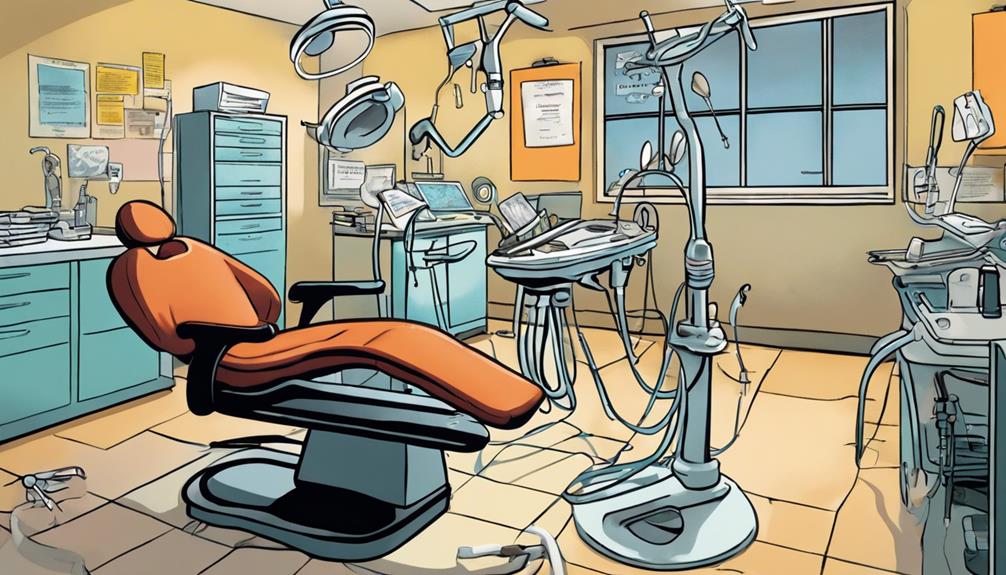
Many kidney patients often struggle to find affordable dental care, but several resources can help bridge that gap. Understanding these options can empower you to maintain your dental health while managing kidney-related issues.
Here are four key resources to take into account:
- Dental Lifeline Network: They provide Donated Dental Services (DDS) for eligible individuals, offering essential treatments at no cost.
- Transplant Teams: Your transplant team may have financial assistance resources available specifically for kidney patients needing dental treatments.
- Preventive Dental Care: By focusing on preventive care, you can greatly reduce the need for costly procedures, ultimately saving money in the long run.
- Medicare Coverage: While Medicare covers dental clearance exams necessary for transplant evaluations, it doesn't cover additional treatments. Consequently, seeking financial aid is imperative.
Being aware of these support systems is important. By taking advantage of available financial assistance, you can make sure that your dental health doesn't suffer due to the financial burden, helping you avoid complications that untreated oral issues might cause.
Exploring the Oral-Systemic Connection
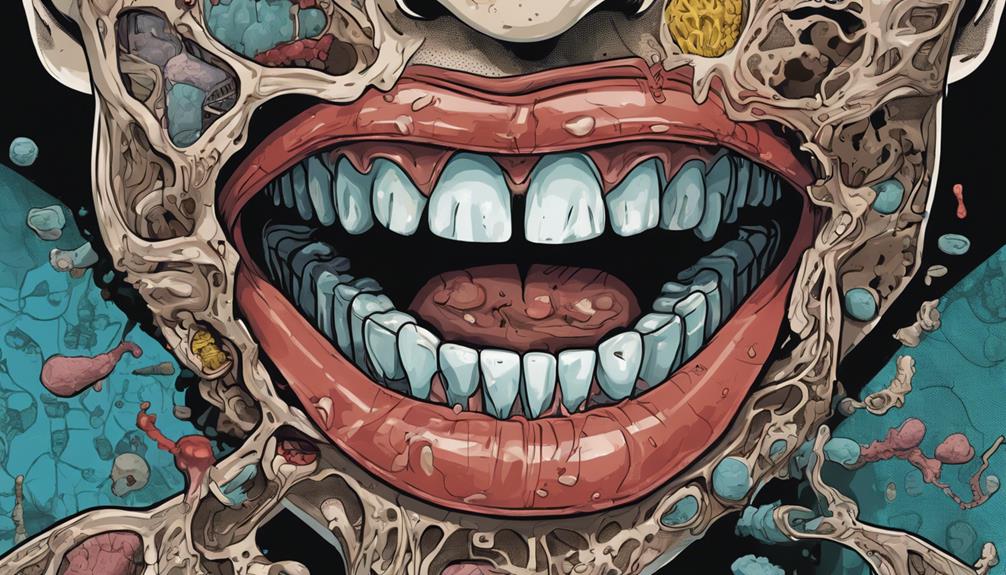
The connection between oral health and kidney function is vital, as issues in your mouth can greatly impact your overall health. If you have kidney disease, you're at a higher risk for oral problems like tooth decay and gum disease. Reduced saliva production can lead to dry mouth, making it easier for bacteria to thrive.
| Oral Health Issue | Impact on Kidney Health |
|---|---|
| Tooth Decay | Increases risk of infections |
| Gum Disease | Bacteria can enter the bloodstream |
| Dry Mouth | Heightens risk of tooth decay |
| Periodontal Disease | Linked to chronic inflammation |
| Poor Oral Hygiene | Worsens kidney conditions |
Chronic inflammation from kidney disease can worsen gum disease, creating a vicious cycle that affects both your mouth and kidneys. Studies show that even a small reduction in kidney function can lead to significant periodontal inflammation. Consequently, maintaining good oral hygiene is vital. By taking care of your oral health, you can help mitigate risks associated with kidney disease and improve your overall well-being. Remember, your mouth and kidneys are more connected than you might think!
Frequently Asked Questions
Can Kidney Disease Affect Your Teeth?
Yes, kidney disease affects your teeth. It can weaken your immune system, cause dry mouth, and lead to gum disease, increasing your risk for cavities and tooth loss. Maintaining oral health is essential for overall well-being.
What Are the Symptoms of Kidney Disease in the Mouth?
You might notice symptoms like a foul mouth odor, red ulcers, or dry mouth if you have kidney disease. These issues can lead to increased risk of cavities, gum disease, and oral infections.
Which Teeth Are Connected to the Kidneys?
You might find it intriguing that your lower incisors and canines are linked to your kidneys. Traditional beliefs suggest this connection, hinting that maintaining kidney health could help keep these teeth strong and healthy.
What Are Signs That There Is Something Wrong With Your Kidneys?
If you notice persistent fatigue, swelling in your legs, changes in urine output, or skin rashes, it could signal kidney problems. Difficulty concentrating or high blood pressure may also indicate something's wrong with your kidneys.
Can Certain Beverages Affect Kidney Health and Dental Health at the Same Time?
Certain beverages like water, milk, and green tea are considered the best beverages for dental health. However, sugary and acidic drinks like soda and fruit juices can negatively affect both kidney health and dental health. It’s important to choose beverages that support overall health, including the kidneys and teeth.
Conclusion
In the intricate dance between kidney health and oral hygiene, neglecting one can lead to a waltz of problems for the other.
Just like a well-tuned instrument, your body thrives when all parts are in harmony.
For instance, studies show patients with chronic kidney disease are 2-3 times more likely to suffer from dental decay.
So, don't let your smile fade; prioritize both your kidneys and your teeth for a healthier, brighter life.
